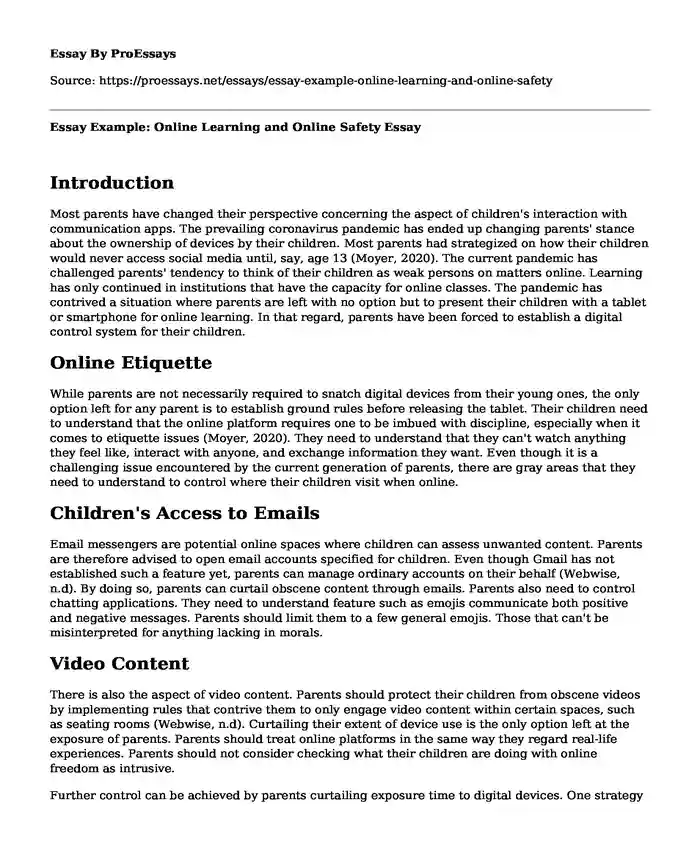Introduction
Most parents have changed their perspective concerning the aspect of children's interaction with communication apps. The prevailing coronavirus pandemic has ended up changing parents' stance about the ownership of devices by their children. Most parents had strategized on how their children would never access social media until, say, age 13 (Moyer, 2020). The current pandemic has challenged parents' tendency to think of their children as weak persons on matters online. Learning has only continued in institutions that have the capacity for online classes. The pandemic has contrived a situation where parents are left with no option but to present their children with a tablet or smartphone for online learning. In that regard, parents have been forced to establish a digital control system for their children.
Online Etiquette
While parents are not necessarily required to snatch digital devices from their young ones, the only option left for any parent is to establish ground rules before releasing the tablet. Their children need to understand that the online platform requires one to be imbued with discipline, especially when it comes to etiquette issues (Moyer, 2020). They need to understand that they can't watch anything they feel like, interact with anyone, and exchange information they want. Even though it is a challenging issue encountered by the current generation of parents, there are gray areas that they need to understand to control where their children visit when online.
Children's Access to Emails
Email messengers are potential online spaces where children can assess unwanted content. Parents are therefore advised to open email accounts specified for children. Even though Gmail has not established such a feature yet, parents can manage ordinary accounts on their behalf (Webwise, n.d). By doing so, parents can curtail obscene content through emails. Parents also need to control chatting applications. They need to understand feature such as emojis communicate both positive and negative messages. Parents should limit them to a few general emojis. Those that can't be misinterpreted for anything lacking in morals.
Video Content
There is also the aspect of video content. Parents should protect their children from obscene videos by implementing rules that contrive them to only engage video content within certain spaces, such as seating rooms (Webwise, n.d). Curtailing their extent of device use is the only option left at the exposure of parents. Parents should treat online platforms in the same way they regard real-life experiences. Parents should not consider checking what their children are doing with online freedom as intrusive.
Further control can be achieved by parents curtailing exposure time to digital devices. One strategy upon which parents can control their children from accessing unwanted content in online platforms is by recommending a schedule when digital devices can be used. During those time-spaces, an adult is required around the child. If parents are busy to the extent that they can't avail themselves for oversight purposes, there is an alternative (Webwise, n.d). They can consider subscribing to a technology agreement. It's worth noting that parents should not play rude to their children. Naturally, they are likely to explore online spaces, similar to their exploration in real-life situations. In that regard, parents should create a guide against which children should be redirected.
Conclusion
The prevailing coronavirus pandemic has contrived parents to allow their children to access online platforms. Due to challenges emanating from the current pandemic, schools converted their physical teaching approaches to online. Parents were left with no other option rather to provide their children with devices that would facilitate online studies. Considering that online platforms can come with both positive and negative repercussions, parents are obliged to control their children's locations while online.
References
Moyer, M.W. (2020, April 2). Teaching our kids to be Safe Online: A Hasty Primer. The New York Times, Parenting.
Webwise, (n.d). How to set up parental controls on all devices. https://www.webwise.ie/parents/parental-controls-2/
Cite this page
Essay Example: Online Learning and Online Safety. (2024, Jan 09). Retrieved from https://proessays.net/essays/essay-example-online-learning-and-online-safety
If you are the original author of this essay and no longer wish to have it published on the ProEssays website, please click below to request its removal:
- Reflective Essay on Volunteerism in Hunger Resource Center
- Anthrax Paper Example
- Essay Sample on Providing Healthcare Services for All Without Discrimination
- Essay on Strategic Communication: Exploring Fenton and Career Opportunities
- Essay Example on Cultural Clash: Examining Black American Perception in the U.S.A.
- Essay on Communication Evolved: Exploring the Impact of Technology on Advertisements
- The Kardashian Effect: Exploring Consumers' Intention to Pursue Cosmetic Surgery - Essay Sample







